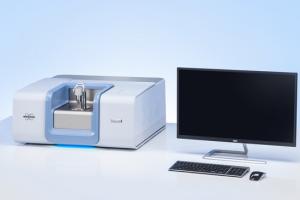Bruker Invenio-S FTIR Spectrometer

About
Location: Jesser Hall 162
Bruker Invenio-S FTIR spectrometer for compound identification and the determination of sample chemistry/molecular bonding for solids, films, powders, liquids, and suspensions.
Bruker FTIR Technique Summary:
- Nondestructive interferometric compositional measurement of molecular vibrational modes
- Minimal or no sample preparation required
- Single-reflection attenuated total reflectance (ATR) for measurement of surface properties of solids, thin film samples (approx. 0.5-2 microns), and liquids
- Transmission spectroscopy for characterization of IR-transparent films
- Diffuse reflectance spectroscopy with Pike Technologies EasyDiff accessory for compositional analysis of powders and rough surfaces
- OPUS 8.0 integrated evaluation, data processing (identification and quantification) and report generation software with spectral library
- Variable spot size: 0.25 - 8 mm diameter
Bruker Invenio-S FTIR Features:
- Spectral range of 8000 - 350 cm-1 with resolution 0.4 - 256 cm-1 (adjustable)
- MIR Globar with CenterGlow IR source, KBr windows, and high-sensitivity temperature-controlled DLaTGS-detector
- Aluminum mirrors for future expansion to UV-Vis
- Wavenumber accuracy: < 0.01 cm-1 @ 1,554 cm-1
- Repeatability: < 0.0005 cm-1 @ 1,554 cm-1
- Photometric accuracy: < 0.1%
- Scan speed: 6 velocities; 1.4 - 51 mm/sec opd
- Aquisition rate: up to 25 spectra per second @16 cm-1 resolution
- Integrated reference materials and automated test routines.
- Compliant with Good Laboratory Practice (GLP) requirements.
- Sample Compartment Size: 25.5 (W) x 27 cm (D) x 22.5 cm (H)
Contact Us
Catherine Dukes
Catherine Dukes directs the Laboratory for Astrophysics and Surface Physics (LASP) and provides expertise in X-ray photoelectron spectroscopy (XPS) for the University of Virginia's Nanoscale Materials Characterization Facility (NMCF). Her NSF and NASA funded research focuses on the interaction of radiation with surfaces.

Joe Thompson
Joe Thompson joined the NMCF as a Laboratory Specialist, also providing analysis for the Virginia Department of Transportation (VDOT). He specializes in Raman Spectroscopy, Atomic Force Microscopy, and Optical and Electron Microscopies.